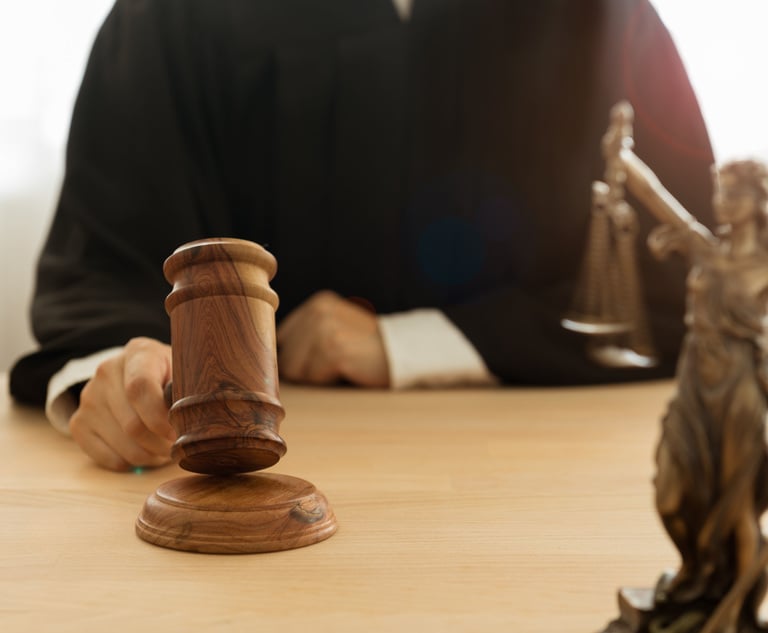Why NJ Expungement Legislation Wasn't Signed
"Our system is not set up to do this now," Gov. Phil Murphy said of automatic expungements for marijuana and other low-level offenses, "and undertaking this task will require buy-in and commitment from all three branches of government."
August 29, 2019 at 11:19 AM
7 minute read
 N.J. Gov. Phil Murphy speaking at his inauguration. Photo by Carmen Natale.
N.J. Gov. Phil Murphy speaking at his inauguration. Photo by Carmen Natale.
When Gov. Phil Murphy conditionally vetoed legislation intended to make major reforms to New Jersey's expungement law and allow individuals convicted of minor marijuana and hashish-related offenses to expunge their records, it was in part because of the burden that he said it could put on the court system and those using it.
In his conditional veto letter on Aug. 23, Murphy made several recommendations that he said would strengthen the legislation. He also urged adding amendments suggested by the Administrative Office of the Courts.
"While laudable for its social justice aims, such a process may have the unintended and unfair effect of delaying the review of standard expungement petitions," said the governor's office in an Aug. 23 release on S-3205.
The bill, sponsored by Sen. Sandra Bolden Cunningham, D-Hudson, Sen. M. Teresa Ruiz, D-Essex, and Senate President Stephen Sweeney, D-Gloucester, passed the Senate by a 24-12 vote on June 10. The Assembly version of the bill, A-4498, won final legislative approval in the full Assembly, 50-15-6, on the same day.
As passed, S-3205 provides for an expedited expungement process for certain minor marijuana, hashish, and paraphernalia convictions.
The governor, with his conditional veto, said he was intent on creating "a pathway to automatic expungement" that was less time-consuming and financially draining on individuals eligible under the bill. That would require looking into the technology and cost required, among other considerations, he said.
In his 19-page conditional veto addressed to the state Senate, Murphy wrote: "Thus, only those individuals who actually apply for an expungement, meaning those who are aware of this potential remedy and have the wherewithal to navigate the legal process or afford an attorney to assist them, would be able to seek the relief afforded by the expungement process. This method is not the most efficient means for clean slate expungement, nor will it deliver relief to all eligible individuals who need it.
"To avoid this shortcoming, we should follow the lead of Pennsylvania and undertake the necessary steps to establish an automated, computerized expungement system that would allow people with multiple convictions for less serious, non-violent crimes who maintain a clean record for 10 years to clear their criminal histories without having to hire a lawyer or wade through a paperwork-intensive process," added Murphy.
"Our system is not set up to do this now, and undertaking this task will require buy-in and commitment from all three branches of government. On behalf of the executive branch, that is a commitment I am more than willing to make."
Murphy's recommendations require the creation of a system for automatic expungements for those with clean records for at least 10 years, and allow for judicial sealing of low-level marijuana offenses to ensure that individuals cannot have those convictions used against them in the future.
The governor said he prefers an expungement process that provides relief while avoiding delays.
"I applaud the sponsors' commitment to social justice, and their efforts to correct historic wrongs inflicted on our communities by a criminal justice system that has at times unfairly, and harshly[,] punished individuals," Murphy said. "Providing relief for those who have served their time, and lifting the constraints placed on them from finding meaningful work, and providing for their families following a conviction and time served is a priority that I share with legislative leaders and advocates.
"However, I believe this bill can go further for the cause of justice, and I am hopeful that we can move forward together with a bill that provides a path to automatic expungement and allows for relief for those convicted of low-level marijuana offenses."
Murphy's recommended changes in the law would:
- Require the state to implement an "automated clean slate expungement system" for individuals convicted of multiple crimes who have had a clean record for at least 10 years, to remove the need for an attorney or a paperwork-heavy administrative process;
- Establish a streamlined, electronic expungement filing system that would eliminate filing fees to petition for an expungement and the current expense of sending petition notices to various law enforcement agencies;
- Establish a task force to study the technological, fiscal, resource and practical issues and challenges involved in developing such a system, and to provide recommendations on how to create the system;
- Establish a clean slate petition process made available for the limited period between the bill's effective date and the implementation of an automated expungement system;
- Provide for a $15 million supplemental appropriation to the Department of Law and Public Safety to support its processing of clean slate expungement petitions.
- Have the court immediately seal an individual's record on the disposition of expunged charges, in part to ensure that sealed convictions won't be used for sentencing purposes in any other case.
Some expressed their support for the governor's conditional veto.
"The NAACP has been involved in the cannabis conversation solely because of its connection to civil rights," said Richard Smith, president of the NAACP New Jersey state chapter, in a statement. "We believe that the wrongs committed by the war on drugs and its agents cannot begin to be repaired until people can have their lives back from senseless low-level marijuana offenses. We are glad to see the Governor's office conditionally veto this bill in hopes of making it stronger and the language clearer."
"On behalf of the Latino Action Network we celebrate not only this legislation but also Gov. Murphy's conditional veto that adds automatic expungement for individuals who have stayed crime and conviction free for 10 years or more," said Cuqui Rivera, criminal justice reform chair at the Latino Action Network, in a statement. "The stigma surrounding a criminal record is debilitating in so many aspects of one's journey that to rebuild their lives after time served is virtually beyond possible. As advocates in criminal justice reform for the last two decades, we have worked long and hard on this very legislation."
Amol Sinha, executive director of the American Civil Liberties Union of New Jersey, said the organization would work with the governor's recommended task force and lawmakers to create a more efficient system for expungements. She said the conditional veto "puts our state on the path to ensure that New Jerseyans burdened with criminal convictions—disproportionately people of color—will no longer need to navigate an onerous legal system to obtain the well-documented benefits of expungement. Instead, they will be able to expunge their records as soon as they become eligible."
But Cunningham, prime sponsor of the expungement reform legislation that includes a provision named after her, said Murphy's proposal would limit the number of people eligible for expungement.
"For the past three years, I have worked with a broad array of civil rights advocates and law enforcement officials to improve New Jersey's expungement laws. As Americans and New Jerseyans, we believe in second chances," Cunningham said in a release.
The "Cunningham Cleanser" in S-3205 as passed permits formerly incarcerated persons to petition the court after 10 years of law-abiding life to expunge their criminal record.
"The proposed changes would significantly lessen the number of individuals who would be eligible for expungement. If expungement is a good step toward responsible citizenship, then we should be broadening the opportunity for people to expunge their records and to rejoin the workforce. There has to come a time when we understand the importance of permitting people to have a second chance."
When asked to respond to Cunningham's remarks, Alyana Alfaro, press secretary for Murphy, said on Wednesday that the governor was sticking to the statements contained in the conditional veto.
The expungement bill went through a few iterations last legislative session. While separate legislation addressing the issue was formerly introduced in November 2018, Murphy in his state budget address last March said he would support marijuana legalization only if expungement reform were made part of the package. And so expungement of minor marijuana offenses later got incorporated into the adult use marijuana bill. But that measure stalled in both houses in April, and was declared officially dead for the remainder of the 2019 legislative calendar on May 15 because of insufficient votes.
This content has been archived. It is available through our partners, LexisNexis® and Bloomberg Law.
To view this content, please continue to their sites.
Not a Lexis Subscriber?
Subscribe Now
Not a Bloomberg Law Subscriber?
Subscribe Now
NOT FOR REPRINT
© 2025 ALM Global, LLC, All Rights Reserved. Request academic re-use from www.copyright.com. All other uses, submit a request to [email protected]. For more information visit Asset & Logo Licensing.
You Might Like
View All

Judge Jablonski and Chief Justice Rabner Both Acted Completely Properly
4 minute read
In 2-1 Ruling, Court Clears Way for Decade-Old Wrongful Imprisonment Suit
5 minute read
Trending Stories
- 1'Not the President's Personal Lawyer': Lawyers Share Concerns Over How AG Pick Bondi’s Loyalism to Trump May Impact DOJ
- 2US Judge OKs Partial Release of Ex-Special Counsel's Final Report in Election Case
- 3The Demise of Truth and Transparency in Federal Sentencing
- 4Former Phila. Solicitor Sozi Tulante Rejoins Dechert
- 5'I've Seen Terrible Things': Lawyer Predicts Spike in Hazing Suits
Who Got The Work
Michael G. Bongiorno, Andrew Scott Dulberg and Elizabeth E. Driscoll from Wilmer Cutler Pickering Hale and Dorr have stepped in to represent Symbotic Inc., an A.I.-enabled technology platform that focuses on increasing supply chain efficiency, and other defendants in a pending shareholder derivative lawsuit. The case, filed Oct. 2 in Massachusetts District Court by the Brown Law Firm on behalf of Stephen Austen, accuses certain officers and directors of misleading investors in regard to Symbotic's potential for margin growth by failing to disclose that the company was not equipped to timely deploy its systems or manage expenses through project delays. The case, assigned to U.S. District Judge Nathaniel M. Gorton, is 1:24-cv-12522, Austen v. Cohen et al.
Who Got The Work
Edmund Polubinski and Marie Killmond of Davis Polk & Wardwell have entered appearances for data platform software development company MongoDB and other defendants in a pending shareholder derivative lawsuit. The action, filed Oct. 7 in New York Southern District Court by the Brown Law Firm, accuses the company's directors and/or officers of falsely expressing confidence in the company’s restructuring of its sales incentive plan and downplaying the severity of decreases in its upfront commitments. The case is 1:24-cv-07594, Roy v. Ittycheria et al.
Who Got The Work
Amy O. Bruchs and Kurt F. Ellison of Michael Best & Friedrich have entered appearances for Epic Systems Corp. in a pending employment discrimination lawsuit. The suit was filed Sept. 7 in Wisconsin Western District Court by Levine Eisberner LLC and Siri & Glimstad on behalf of a project manager who claims that he was wrongfully terminated after applying for a religious exemption to the defendant's COVID-19 vaccine mandate. The case, assigned to U.S. Magistrate Judge Anita Marie Boor, is 3:24-cv-00630, Secker, Nathan v. Epic Systems Corporation.
Who Got The Work
David X. Sullivan, Thomas J. Finn and Gregory A. Hall from McCarter & English have entered appearances for Sunrun Installation Services in a pending civil rights lawsuit. The complaint was filed Sept. 4 in Connecticut District Court by attorney Robert M. Berke on behalf of former employee George Edward Steins, who was arrested and charged with employing an unregistered home improvement salesperson. The complaint alleges that had Sunrun informed the Connecticut Department of Consumer Protection that the plaintiff's employment had ended in 2017 and that he no longer held Sunrun's home improvement contractor license, he would not have been hit with charges, which were dismissed in May 2024. The case, assigned to U.S. District Judge Jeffrey A. Meyer, is 3:24-cv-01423, Steins v. Sunrun, Inc. et al.
Who Got The Work
Greenberg Traurig shareholder Joshua L. Raskin has entered an appearance for boohoo.com UK Ltd. in a pending patent infringement lawsuit. The suit, filed Sept. 3 in Texas Eastern District Court by Rozier Hardt McDonough on behalf of Alto Dynamics, asserts five patents related to an online shopping platform. The case, assigned to U.S. District Judge Rodney Gilstrap, is 2:24-cv-00719, Alto Dynamics, LLC v. boohoo.com UK Limited.
Featured Firms
Law Offices of Gary Martin Hays & Associates, P.C.
(470) 294-1674
Law Offices of Mark E. Salomone
(857) 444-6468
Smith & Hassler
(713) 739-1250






